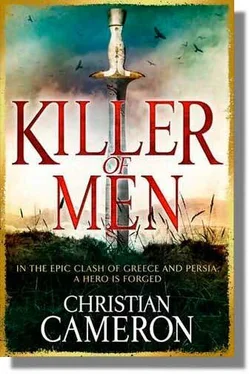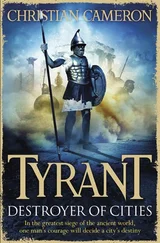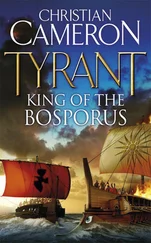Christian Cameron - Killer of Men
Здесь есть возможность читать онлайн «Christian Cameron - Killer of Men» весь текст электронной книги совершенно бесплатно (целиком полную версию без сокращений). В некоторых случаях можно слушать аудио, скачать через торрент в формате fb2 и присутствует краткое содержание. Жанр: Исторические приключения, на английском языке. Описание произведения, (предисловие) а так же отзывы посетителей доступны на портале библиотеки ЛибКат.
- Название:Killer of Men
- Автор:
- Жанр:
- Год:неизвестен
- ISBN:нет данных
- Рейтинг книги:4 / 5. Голосов: 1
-
Избранное:Добавить в избранное
- Отзывы:
-
Ваша оценка:
- 80
- 1
- 2
- 3
- 4
- 5
Killer of Men: краткое содержание, описание и аннотация
Предлагаем к чтению аннотацию, описание, краткое содержание или предисловие (зависит от того, что написал сам автор книги «Killer of Men»). Если вы не нашли необходимую информацию о книге — напишите в комментариях, мы постараемся отыскать её.
Killer of Men — читать онлайн бесплатно полную книгу (весь текст) целиком
Ниже представлен текст книги, разбитый по страницам. Система сохранения места последней прочитанной страницы, позволяет с удобством читать онлайн бесплатно книгу «Killer of Men», без необходимости каждый раз заново искать на чём Вы остановились. Поставьте закладку, и сможете в любой момент перейти на страницу, на которой закончили чтение.
Интервал:
Закладка:
At any rate, she left him, and when she was gone, as is the way with men, he missed her. So he asked her back. But when you are a god, and the father of gods – aye, or when you are merely a mortal man and full of your own importance – it is hard to ask forgiveness, and harder still to be refused.
So Zeus went into Boeotia, and in those days there were kings. He found the king – a Plataean, of course – and asked him for advice.
The king thought about it for a day. If he had any sense, he asked his own wife. Then he went back to mighty-thewed Zeus, and he no doubt shrugged at the irony of it all. And he said, 'Mighty Zeus, first among gods and men, you can win back beautiful cow-eyed Hera if you make her jealous, by making her think that you intend to replace her for ever.' So he proposed that they make a wooden statue of a beautiful kore, a maiden in a wedding gown. And that they take it to the sacred precincts on the mountain, and imitate the manner of men and women going to a wedding.
'Hera will come in all her glory to destroy her usurper,' the king said. 'And when she sees that it's nothing but a billet of wood, she'll be moved to laughter. And then you'll be reconciled.'
Perhaps Zeus thought it was the silliest plan he'd ever heard, but he was desperate. To an old man like me, it seems a deeply cynical plan. But for all that, it worked. The wedding procession wound up the hillside, and Hera came and destroyed the statue with her powers. Then she saw that she had merely burned a piece of wood, and she laughed, and she and Zeus were reconciled, and celebrated their eternal marriage again.
So every town in Boeotia used to take turns to celebrate the Daidala – forty-eight towns, and in the forty-ninth year, the Great Daidala, when the fires burned like the beacons burned when the Medes came. And they would compete to celebrate with the best festival, the largest fire, the finest ornaments on the dresses, the most beautiful kore. But as Thebes's federation gained power, so Thebes took over the festivals. They would allow no rival, and the Daidala was celebrated only by Thebes – and little Thespiae and our Plataea. Only our two little states dared to insist on our ancient rights.
Now, when the men of Thebes bested us that time, our leaders signed their treaty, accepted their laws and accepted the federation, the way a poor man accepts a bad sausage in the market when he dares not haggle. But the treaty said nothing about the Daidala. And Plataea's turn was coming – her first turn to celebrate the festival in nigh on fifty years.
For a year after the battle, men said little about it. But then the Plataean Daidala was just a few years away – and towns worked for years to make the festival great. So it was that not long after the priest came to our house – this is how I remember it – and the forge fire was relit, men started to come back to the forge. First they came to have their pots mended, and their ploughs straightened, but soon enough they came to talk. As the weather changed, and Pater worked outside, men would come as soon as their farm work was done – or before – and they would sit on Pater's forging stumps, or recline against the cow's fence or her shed. They would bring their own wine and pour it for each other or for Pater, and they would talk.
I was a boy, and I loved to hear men talk. These were plain men, not lords – but not fools, either. Even here in this house I hear the life of the rustic made a thing of fun. Perhaps. Perhaps there are boors who think more of the price of an ass than of a beautiful statue. What of it? How many of these philosophers could plough a straight furrow, eh, girl? There is room in the world for many kinds of wisdom – that was the revelation of my life, and you should write it down.
Hah! It is good to be lord.
At any rate, by the end of the day we'd have the potter, Karpos, son of Phoibos, the wheelwright, Draco, son of Draco, the leather worker, Theron, son of Xenon, some of their slaves and a dozen farmers in the yard. And they would debate everything from the immortality of the gods to the price of wheat at the market in Thebes – and Corinth, and Athens.
Athens. How often in this story will I mention her? Not my city, but crowned in beauty and strong, in a way Plataea could never be strong – yet capricious and sometimes cruel, like a maiden. As you will be, soon enough, my dear. Athens is now the greatest city in the world – but then she was just another polis, and outside of Attica, men paid her little heed.
Yet she was starting to learn her power. I must weary you with some history. Athens had been under a tyranny for forty years – the Pisistratidae. Some say that the tyrants were good for Athens, and some say they were bad. I have friends of both groups, and I suspect the truth was that the tyrants were good in some ways and bad in others.
While the tyrants were lording it over Athens, the world was changing. First, Sparta rose to power, initially by crushing the cities nearest to her, and then by forcing the rest of their neighbours into a set of treaties that compelled them to serve Sparta. Now, in the Peloponnese – everywhere else, too – only men of property fought in the battles. Slaves might throw rocks, and poor farmers might throw a javelin, but the warriors were aristocrats and their friends.
Armies were small, because there are, thank the gods, only so many aristocrats in the world. But when Sparta created her 'League', she changed the world. Suddenly the Peloponnese could field a bigger army than anyone else. Spartans are great warriors – just ask them – but what made them dangerous was their size. Sparta could put ten thousand men in the field.
The other states had to respond. Thebes formed her own league, the Federation of Boeotia, but other states had to find another way to provide that manpower. In Plataea, we took to arming every free man. Even so, we could never, as I have said, muster more than fifteen hundred armed men.
In Athens, the tyrants kept their armies small. They did not permit men to carry arms abroad, and when they had to fight, they hired mercenaries from Thessaly and Scythia. They didn't trust their people.
Don't fool yourself, honey. We're tyrants, too.
At any rate, while I was a boy, the Pisistratidae fell. The survivors ran off to the Great King of Persia and Athens became a democracy. Suddenly, in a day, Athens had the manpower to field a big army – ten thousand hoplites or more. The Athens of my boyhood was like a boy who has just developed his first muscles.
You've stayed awake through my history lesson – that fellow who is courting you must be having his effect. The point is – there is a point, honey – that for the first time, Athens was feeling strong, and she was suddenly open as a market for the Plataeans, just over the mountains and guarding the pass to Thebes. Some of the richer farmers had learned that if they carted their olive oil and grain and wine over the mountain to Athens, they fetched a much better price than they got in the market of little Plataea – or in the market of mighty Thebes.
I longed to go to Athens. I dreamed of it. I had heard that the whole city was built of Parian marble. Lies, of course, but you have dreams of your own – you know what dreams are like. And we heard that the Alcmaeonidae were building the new Temple of Apollo at Delphi of marble – it had never been done before – and it was a marvel. Draco the wheelwright, as close to a good friend as Pater had, went on a pilgrimage to Delphi and came back singing of the new temple.
Bah, give me that wine cup and never mind an old man's digressions. Anyway, the talk that summer was of the Daidala and the price of grain.
Epictetus was the richest of the local farmers. He'd been born a slave and made all his wealth from his own sweat, and he might have been old Hesiod reborn. A hard man to cross. But he'd just made the trip to Athens the year before and he swore by it. I remember the day that he pulled up with a wagon full of hired hands.
Читать дальшеИнтервал:
Закладка:
Похожие книги на «Killer of Men»
Представляем Вашему вниманию похожие книги на «Killer of Men» списком для выбора. Мы отобрали схожую по названию и смыслу литературу в надежде предоставить читателям больше вариантов отыскать новые, интересные, ещё непрочитанные произведения.
Обсуждение, отзывы о книге «Killer of Men» и просто собственные мнения читателей. Оставьте ваши комментарии, напишите, что Вы думаете о произведении, его смысле или главных героях. Укажите что конкретно понравилось, а что нет, и почему Вы так считаете.












